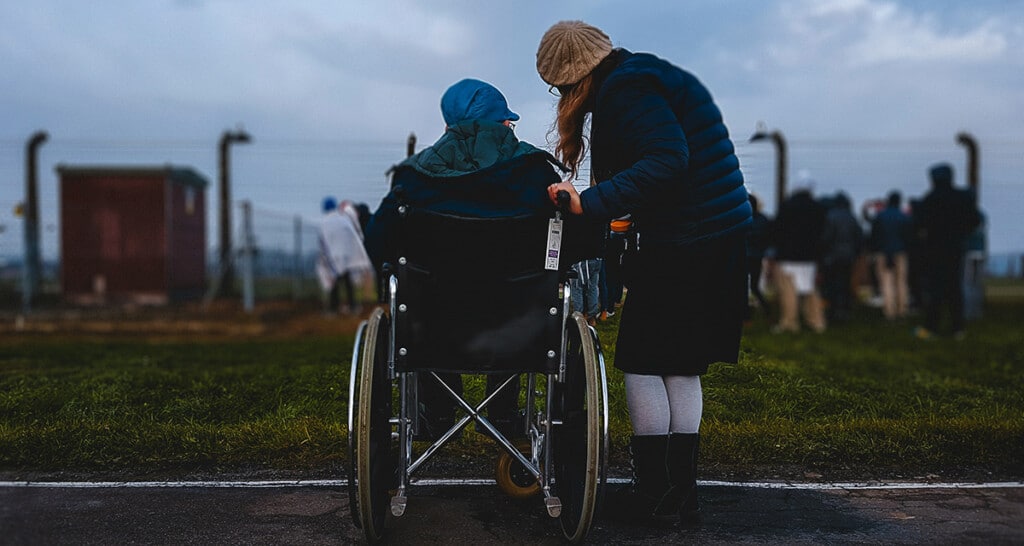The lives of disabled and dying people have value and worth
This article is the Feature piece in our recent Social Issues Bulletin – Issue 57 which is available to download here.

I was 17 years old when I first became involved in end-of-life care. I was a carer at a wonderful Christian Pilgrims’ Friend Society care home and looked after an elderly lady who was dying. Over a period of weeks, she grew weaker until, one day, she died – slipping from her deep sleep into eternity. She didn’t seem distressed in any way, nor did she have symptoms or a need for medication; in fact, her death was so peaceful it was almost unrecognisable. Her life, and her peaceful, dignified, expected death, had a remarkable impact on me. I felt as if I’d been allowed into a sacred, private space and was deeply privileged to care for her in her final moments before she met her Saviour.
This experience, along with many other precious ones, fuelled my desire to become a palliative care nurse and to do all I can, with God’s help, to care for people who are dying – reminding them that they remain valuable, not because of what they can do, but because of who they are. They are precious and irreplaceable, not forgotten or considered a burden.
God’s heart for the vulnerable
God’s fatherly heart for people on the margins is carved upon every page of scripture. Remembering this, and that each person is an image-bearer known intimately by God, impacts the way you care. From my experience as a nurse, and as I connect now with carers working across the care sector, I see that God strategically places Christians to protect and value the most vulnerable in society: those with learning and physical disabilities, with mental health challenges, those ageing and becoming frail with increasing care needs, and those approaching the end of life. No life reaches a point where it is no longer worth living (Ps 23:4-6), and the vulnerable must be protected.
Carers have shared incredible stories about God revealing his love to those at risk of being marginalised. One carer, while silently praying in her heart for a young person with profound physical and learning disabilities, was asked by him, ‘Who are you talking to?’ It became clear that he could somehow hear her praying, said he liked it, and asked her to continue! Just last week, I visited a friend living with advanced dementia who is often quite disoriented. Yet, when we started talking about our Saviour, her thoughts became crystal clear. She knew exactly who she was in Christ and all that he has done for her. Though our conversation was slow and repetitive at times, our moments talking to God were rich, full of clarity and love. Jesus shows tenderness to those who are more vulnerable, and we must do all we can to protect people like this, who could be at risk if assisted suicide were legalised.
Being present
‘Suffering is not a question which demands an answer, it’s not a problem which demands a solution… it’s a mystery which demands a presence’ – Prof. John Wyatt.
We are so often placed by God to be ‘present’. One carer shared how the person they support was longing for a pill to end their life because they could see no point in carrying on. We are trusted by frightened people who sometimes feel suicidal and who can perhaps be more honest with us than with their own loved ones. This particular carer has remained committed, compassionate, and kind to the person, has prayed for her, and now the lady no longer wants to end her life. Instead, she looks forward to the carer’s visits and the hope and joy she brings. Carers, along with many other health and social care professionals, have the privilege and opportunity to bring kindness, hope, and compassion to people who may be in the depths of despair. They do this by listening well, not judging or brushing comments aside, seeking specialist help if needed, and, perhaps most powerfully of all, remaining present, prayerful, and committed, as they shine the love of Christ into the darkness (Matt 5:14–16). But we need to ensure people just like this lady can access care when it’s needed and aren’t left wondering if death would be a more convenient option than waiting for the right health and social care.
Suffering at the end of life
People who are dying can have worries and fears, and I think this is often the cause of their suffering. In my experience, when people express a desire to end their lives prematurely, it is often fear at the root of this: fear of the dying process, fear of unbearable suffering, fear of becoming a burden, fear of losing all control and being alone.
I can honestly say that the majority of people I have nursed at the end of life have not suffered from uncontrolled physical symptoms, whether they’ve been at home, in a hospital, in a care home or a hospice. Contrary to arguments for assisted suicide as relief from ‘intolerable and unbearable suffering’, most of the deaths I’ve seen – hundreds by now – have been very peaceful, expected, dignified deaths. With advances in medicine, physical symptoms can be very well managed and brought to a level that feels acceptable. However, fear, as well as psychological and spiritual pain, cannot be simply fixed by medication. Many of these fears can be soothed by the commitment of people willing to journey with the dying. Listening to worries, explaining what dying might look like, helping plan for the future to retain some control, hearing their voice and respecting their wishes, using time to search for meaning, and providing reassurance of presence – these are all crucial.
To provide this, hospices need increased investment so they can offer holistic care, and the health and social care sector needs urgent help so that we can meet the needs of vulnerable and dying people. It would be devastating to offer affordable assisted suicides instead of investing in our overstretched health and social care services.
Where is God when people are dying?
Being told you have an incurable illness provides an opportunity, some have even said a gift, to reprioritise, to search for meaning, to make amends and to live life to the full. I have seen joyful and deeply profound moments in the last weeks of life: weddings, baptisms, Christmas celebrated in July, trips to big football matches, and visits to safari parks. Ending lives sooner with assisted suicide would rob people of these unexpected moments of happiness and peace that often occur in the final months, weeks, days, and even hours of life.
In God’s kindness, I have seen people meet Jesus in their dying moments after lives distant from him. In his perfect timing, people have encountered the living God, turning from their independence to trust in Jesus, giving them hope and confidence in their final moments, just as the thief on the cross did next to Christ. I also know that God is not limited by levels of consciousness or by our perceptions of communication. He can speak into every heart, so it has been important for me to entrust all unknowns to him.
And as I’ve cared for brothers and sisters in Christ, I’ve always known God’s blessing. As life ebbs away, I am assured that in a matter of moments, this person will become more alive than they have ever been before. You can’t help but wonder what is happening in the heavenly realms. What preparations are under way in their new home? Is Jesus preparing to return for them now? These verses speak to moments like this:
Do not let your hearts be troubled. You believe in God; believe also in me. My Father’s house has many rooms; if that were not so, would I have told you that I am going there to prepare a place for you? And if I go and prepare a place for you, I will come back and take you to be with me that you also may be where I am. (John 14:1–3 NIV)
Do you, like me, sometimes wonder what dying will be like? Our Father, knowing us so well, has the most beautiful plan for that moment. For a Christian, whether a death feels shocking and unexpected or peaceful and welcome, we know with certainty that Jesus himself promises to join us at this moment – to personally come and take us to be with him.




